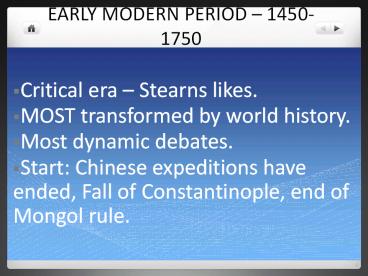EARLY MODERN PERIOD - PowerPoint PPT Presentation
Title:
EARLY MODERN PERIOD
Description:
EARLY MODERN PERIOD 1450-1750 Critical era Stearns likes. MOST transformed by world history. Most dynamic debates. Start: Chinese expeditions have ended, Fall ... – PowerPoint PPT presentation
Number of Views:405
Avg rating:3.0/5.0
Title: EARLY MODERN PERIOD
1
EARLY MODERN PERIOD 1450-1750
- Critical era Stearns likes.
- MOST transformed by world history.
- Most dynamic debates.
- Start Chinese expeditions have ended, Fall of
Constantinople, end of Mongol rule.
2
Themes that are not as important
- Still spread of religions but less important than
P.c. - Spread of civilization NOT a sweeping theme.
- Islam not as strong.
- No changes in womens conditions
- Interactions btwn. Societies continues but gets
redefined.
3
Problems with the 1750 closing date
- ending this sucker not easy.
- Period moves to a period we are more familiar
with in Western world. - Dare to omit the Renaissance.
- This period is not the West and the rest.
West not calling all the shots, but more than in
P.c.
4
Major Themes
- Re-balancing of major societies /power positions
West rises military and economy. - Naval power navy, guns, motivation gives West
power on the seas should not be overstressed,
though. - International commerce.
5
Theme 1 continues
- Rise of Russia becomes a major player.
6
Theme 2 Rise of the Americas.
- Columbian exchange between old world and new
world. - Food, disease, etc.
- American tuber crops affected China.
- Amer. Corn affected Africa and India.
- Europe slower to pick up American crops.
7
Theme 2 cont..
- Trade routes American potato to Spain to
Philippines to China. - Most of Europe picks up later.
- China was NOT isolated during this period they
just picked and chose what they wanted from
others (tea). - Americas hurt in 15-1600s by Columbian trade.
8
Theme 3 Rise of the Gunpowder Empires.
- Political developments loom larger this period.
- Sea based Portuguese, Spanish, Dutch, English.
- Land based Russian, Mughal, Ottoman.
- These are major Empires / political units /
social system.
9
Theme 3 Gunpowder, cont..
- Major change in the Americas and these empires.
- Formation of Asian Empires more important because
they had the biggest cities and the strongest
political structures.
10
Theme 4 Redefinition of world trade.
- West becomes more dominant.
- Americas included in the world trade system.
- Not only was the West more important, but it had
a superior trade position to the subordinate
Americas.
11
Theme 4 cont
- Europe made manufactured goods, controlled
ships, companies were European craft producers. - Americas subordinate raw materials, exports
cheap stuff, import expensive goods losing
money. - Americas rely heavily on slavery and forced labor.
12
Theme 4 cont
- Late 18th Century West trades with Russia (after
Peter the Great) tries to avoid but cant. - Side note European population in the 16th
century grows a little. In the 17th century
stays the same.
13
Questions from period
- Why was the West so much greedier than the Arabs
and others? - Mercantilism only practiced by Europeans.
- Europeans greedily getting silver and precious
metals from Americas to trade with China and
India for porcelain, silk, spices, and perfumes.
14
What is not happening this period?
- No global cultural theme only regional.
- Besides navy not a huge period for
technological advances. - New global historians proto-global but not yet
global trade / cultural diffusion.
15
How does one explain the rise of the West?
- The West is best idea the West rose because a
new Renaissance and culture became more
individualistic, secular, and started exploring.
More effective political units.
16
How does one explain the rise of the West?
- Global perspective The West borrows ideas from
Asia thanks to - Mongols who open trade routes but doesnt destroy
Western Europe. - West wanted new technologies because of constant
warfare. - West faces economic problem how is it going to
pay for all of the goods from Asia?
17
How does one explain the rise of the West?
- West had to go through Muslim merchants to get to
Asia Europeans didnt want to do that wanted
a way around them. - Comparison Europe and Africa are about equal
during p.c. era. - 1500s Euro. Population begins to expand (break
out from Black Death).
18
How does one explain the rise of the West?
- Early Modern Period Asian merchants flourish
strong production. - Europeans desire a way to fix this balance of
trade problem but dont really do so until 1845.































